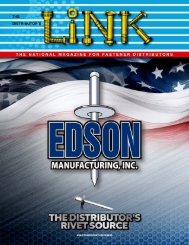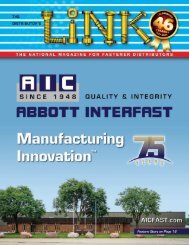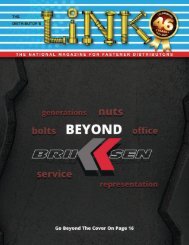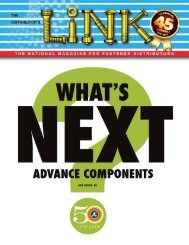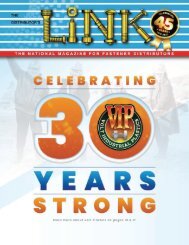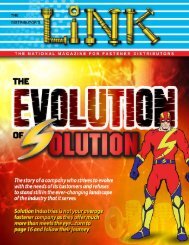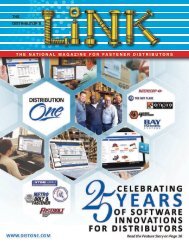SPRING 2022
Distributor's Link Magazine Spring 2022 / Vol 45 No 2
Distributor's Link Magazine Spring 2022 / Vol 45 No 2
- No tags were found...
You also want an ePaper? Increase the reach of your titles
YUMPU automatically turns print PDFs into web optimized ePapers that Google loves.
142<br />
THE DISTRIBUTOR’S LINK<br />
NELSON VALDERRAMA MAYBE IT’S NOT THE MILLENNIALS, MAYBE IT’S YOUR COMPANY from page 60<br />
Apart from changing trends and the COVID-19 crisis,<br />
another challenge that the market is facing is a shortage<br />
of labor. Today, almost every workplace comprises<br />
millennials with their unique way of looking at the world.<br />
According to research, over 19 Million US workers have<br />
quit their jobs since April 2021. It has negatively impacted<br />
the businesses in every sector. To stop this mass<br />
exodus, companies offer employees with financial perks<br />
and bonuses. But millennials are perceptive; instead of<br />
appreciating the gesture, they sense a transaction.<br />
It seems that the organizations are not meeting<br />
their real needs. Employees today feel exhausted,<br />
unenthusiastic, and indifferent towards their organizations.<br />
Despite showering them with monetary benefits, a sense<br />
of shared identity is what they truly crave. If workers don’t<br />
feel valued, seen, heard, and empowered, they lose the<br />
sense of purpose. So meaningful interactions, rather than<br />
transactions, will play a major role as we move forward.<br />
We need a new narrative that can reshape the future of<br />
work. Work will never be the same as it was before the<br />
pandemic. Too many things happened- in the world, inside<br />
organizations, and among employees- catalyzing changes<br />
that had long been brewing.<br />
Taking everything into account, business leaders can<br />
take the following powerful actions.<br />
From Talent Takers To Talent Makers<br />
Organizations are experiencing a skills shortage.<br />
Therefore, scaling investments in learning can play a vital<br />
role. Helping current employees learn and have a growth<br />
mindset will help organizations improve. It is important to<br />
employ ways to tap the hidden potential of their people<br />
and uplift them throughout their career journey.<br />
Job titles are a great way to stand out in the job<br />
market, and they can also provide valuable insight<br />
into how your company and culture are different. For<br />
example, the title of “receptionist” might be revised to<br />
“Customer Experience Associate” This new position will<br />
allow employees more flexibility and responsibility, while<br />
their experience in customer-facing work makes them<br />
invaluable on any project.<br />
Build The Personal Capacity Of Workers<br />
Instead Of Managing Them As Machines<br />
Leaders need to support employees and help them<br />
create a meaningful life. Every person has a unique talent,<br />
and the best leader can reveal and utilize it in the most<br />
productive way. Reorganizing workflows and giving workers<br />
a sense of belonging are great ways to get started.<br />
A shared vision, mutual respect, and common values<br />
unite people. It could be the best way to retain the<br />
workforce and contribute to success. In order to succeed,<br />
we have all been learning how important it is that each<br />
person in our workforce takes more than just their title<br />
and list of skills. The meteoric rise over the past 18<br />
months with tech adoption reminds us again not only do<br />
they need understanding but also consent from those<br />
around them as well!<br />
So, far, we have discussed the unusual job market we<br />
are all facing, and how a change in perspective is needed<br />
to meet that problem. Rather than throwing money at the<br />
problem, this is an opportunity to grow talent, and manage<br />
respectfully.<br />
Before you proceed to the undertaking, ask the<br />
following questions -<br />
Are Your Leaders Motivating?<br />
An organization that lacks motivating leaders often<br />
finds its hardworking employees leaving. If workers do not<br />
feel valued and inspired, they do not feel like giving 100%<br />
to the job. Leaders need to lead with compassion and<br />
empathy.<br />
Are Your Workers In Their Right Positions?<br />
For a successful organization, it is important to have<br />
the right people at the right seats. It becomes more<br />
important for managerial positions where new leadership<br />
skills are essential. If your managers and executives<br />
have no skills to work in hybrid and virtual environments,<br />
training and capability-building will help.<br />
How Strong Was Your Work Culture Before<br />
The Pandemic Hit?<br />
Returning to the office may seem like a blessing<br />
and a way to address lingering culture and connectivity<br />
concerns for many executives. It is time to understand<br />
that the needs of your employees have changed, and your<br />
culture may not have kept up, leading to magnifying the<br />
weaknesses of organizations which was the main topic I<br />
discussed with the two distributors I talked last week.<br />
CONTINUED ON PAGE 143



